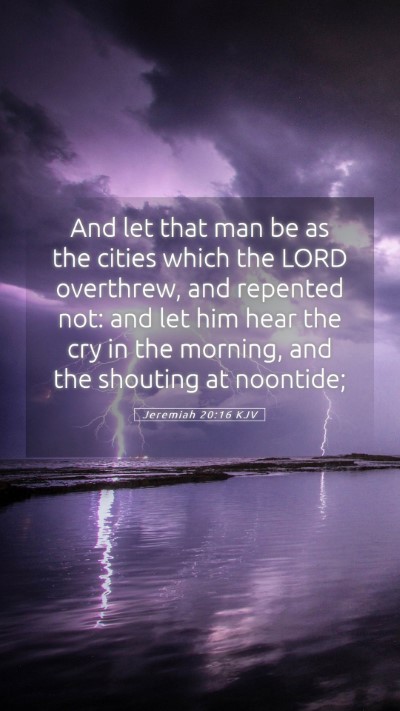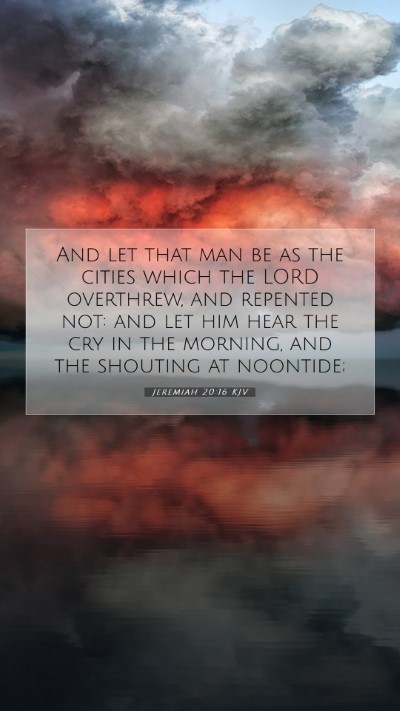Understanding Jeremiah 20:16
Bible Verse: Jeremiah 20:16
"Let that man be like the cities which the LORD overthrew, and repented not; and let him hear the cry in the morning, and the shouting at noontide."
Overview
The verse from Jeremiah 20:16 embodies the prophet Jeremiah’s lamentation over the fate of those who oppose the Divine message. It serves as both a personal expression of his anguish and a broader statement concerning judgment and a lack of repentance.
Context and Interpretation
Context of Jeremiah's Prophecy
Jeremiah is often referred to as the weeping prophet due to his deep sorrow for the sins of his people and the impending judgment. His lamentation in chapter 20 reflects his personal suffering as a result of his prophetic ministry.
The connection of the verse to Old Testament cities, particularly those like Sodom and Gomorrah, illustrates the seriousness of divine judgment and the irrevocable nature of such destruction.
Commentary Insights
- Matthew Henry's Commentary: Henry emphasizes that the reference to cities destroyed by God highlights the complete and utter devastation that can occur due to unrepentant sin. He interprets the verse as a plea for acknowledgment of the severity of rejecting God's truth.
- Albert Barnes' Notes: Barnes supports the idea that Jeremiah’s desire for the oppressor to experience the same fate as the wicked cities portrays the principle of divine justice—the oppressors will likewise face punishment for their actions.
- Adam Clarke's Commentary: Clarke elaborates on the emotional state of Jeremiah, expressing how his prophetic warnings and personal suffering weigh heavily on him. He connects the morning cry and noon shout to a loss of peace in the lives of those facing such dire circumstances.
Theological Implications
This verse speaks to several key theological themes:
- Divine Judgment: The insistence on the fate of unrepentant sinners fortifies the biblical theme of judgment, where nations and individuals face consequences for their actions.
- Repentance: The verse indirectly calls for repentance, as the avoidance of such judgment is intrinsically linked to recognizing one's wrongdoing and turning back to God.
- The Role of the Prophet: Jeremiah’s pain illustrates the struggles of those who proclaim God's message and face rejection and hostility for their faithfulness.
Practical Application
For modern readers, Jeremiah 20:16 can serve as a sober reminder of the consequences of sin and a call to repentance. It encourages a sober reflection on our actions and attitudes towards God’s commands.
Cross References
This verse connects with multiple other passages that reinforce its themes:
- Sodom and Gomorrah’s Destruction: Genesis 19:24-25
- God’s Call for Repentance: Ezekiel 18:30
- Prophetic Suffering: Jeremiah 15:10
Conclusion
In conclusion, Jeremiah 20:16 reflects the profound depths of prophetic anguish and the uncompromising justice of God. Through careful Bible verse interpretations and commentaries, we gain insight into not only the historical and literary context of the scripture but also its ongoing significance in Bible study and personal reflection.
Further Study and Reflection
For those engaging in bible study groups or personal inquiry, this verse could serve as an engaging topic for discussion. Delve into bible study tools that explore themes of judgment, ethical living, and the call for repentance in your lives. Reflect on Jeremiah's plight, the nature of our responses to God's warnings, and the implications for our community.


